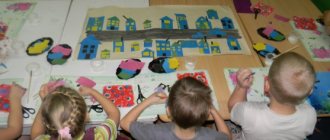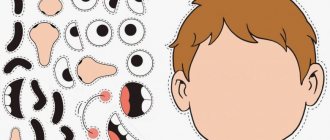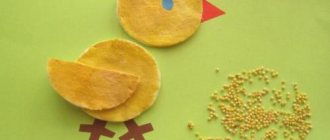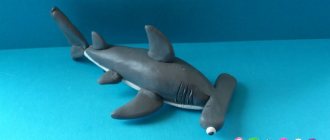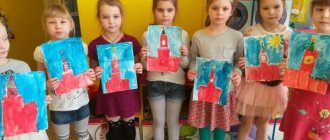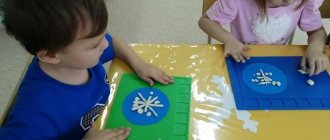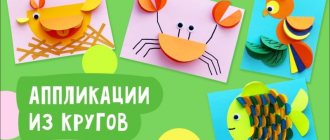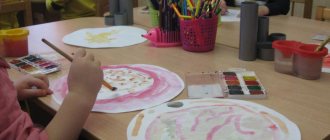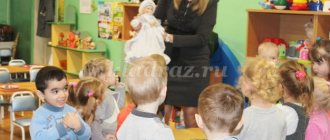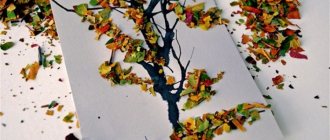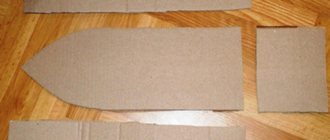Application of geometric shapes “Fish”
Picture, black and white background and templates for work:
The principle of operation for all applications is the same: we cut out the colored templates-details and glue them onto a black and white blank.
To work you will need tools such as:
- scissors;
- PVA glue.
It is important for children to choose comfortable scissors so that they do not have any difficulties during the cutting process. Scissors should be safe, with rounded ends.
Typewriter
When working with a child, it is important to take into account his interests; for example, a boy will be much more interested in assembling a craft in the form of a car. The application will be appreciated by children aged 3-5 years, and for the work you will need colored paper, glue, a simple pencil, scissors and a model of the machine.
Stages of work:
- Shapes are cut out - rectangles for the body, circles for the wheels. You can complement the picture with smoke from ovals, and a route from a black elongated rectangle. Details are added or removed based on the child’s characteristics; if the baby is diligent and easily involved in the task, then you can freely supplement the composition. Don’t forget about the brightness of color, it is what makes the creative process even more interesting.
- Each element is smeared with glue in turn and glued to the background. The road and body come first, and then the wheels and smoke.
For greater expressiveness, you can draw trees, the sun and clouds with colored pencils. Blue color is ideal for a base. In a more complex version, the child himself cuts out the parts along the marked lines.
Application for children “Steam Locomotive”
You can print all the templates as on regular white paper (for copier) in A4 format, or use landscape sheets so that the parts do not wrinkle.
School age children
Junior grades are able to independently separate details according to a model, and can assemble a complete picture, focusing on their imagination. Initially, you should show the children what the finished craft will look like.
To work you will need brushes, colored paper, glue, scissors, cardboard, a ruler and a simple pencil.
A base is prepared, geometric shapes in a specific theme are sketched on it. All details are copied from the base, cut out and glued according to the template.
Templates for work “Tractor driver”
Another option for a children's applique is a tractor driver. For crafts, the simplest shapes are used - a circle, a rectangle. square. By the way, if you don’t have a color printer, you can simply cut out all the indicated shapes from colored paper and paste them onto a base sheet.
"Mill"
Just like in the previous versions, we download the application templates and the base image (it is better to print it on thicker paper). We cut out all the indicated shapes and glue them - an interesting applique craft is ready!
Templates for applique from geometric shapes “Boy”
Application for children “Castle” made of colored paper
The purpose of such work is to introduce the child to such simple geometric shapes as a circle, square, rectangle, semicircle, triangle. Some patterns use more complex shapes - trapezoid, torus, rhombus, oval. The sizes and colors of the figures are also different, which introduces the baby to the concept of shape and color.
All materials are the property of the Vkusnyasha.ru portal and are protected by copyright. This material is not intended for commercial use, only for work in children's groups and at home.
For children from 3 years old
At the age of three, children can already assemble a picture of 6 parts in the correct sequence. You can choose animals for applique that are familiar to the child - for example, a hen with chicks.
For production you will need:
- Green cardboard.
- Yellow circles - 3 pcs.
- White circles of different diameters - 2 pcs.
- Triangles – 1 white, 2 yellow, 3 red, 6 brown.
- Colored markers.
- Glue.
The first step is to prepare a sample, and the children follow the picture and lay out their applique. It is advisable to focus on the baby’s characteristics; for some it is easier to create from a sample, while others prefer to repeat the actions step by step.
Eyes are added to the pasted chickens. The picture can also be supplemented with green grass made from stripes, a bright round sun, and daisies made from white triangles.
For the little ones there is a large selection of colorful applications for creativity, with self-adhesive figures. The kits are sold in bookstores or delivered via courier.
Ready-made sets help develop fine motor skills.
Next riddle
Olga Belokopytova Summary of a lesson on application on the topic: “Riddles.”
Application - “Riddles”.
Goal: to develop ingenuity in children, to practice independent application of acquired skills and knowledge.
Methodology of conducting the lesson:
For each child’s lesson, an envelope is prepared with cut-out parts of various objects enclosed in it. Objects are given of a simple and more complex structure, for example a house, a cart, a carriage, a bus, a trolleybus, a duckling, a fish, etc. (Each name can be repeated 2-3 times)
.
The child's name should be signed on the envelope, taking into account the mental development of each; give one a more difficult task (for example, a trolleybus or a duckling), the other a simpler one (a house or a fish)
. The children must be seated in such a way that envelopes with identical objects do not end up on the same table.
On the day of the lesson, you can enter the group with a large envelope (which contains all individual ones)
and say: “They sent us a letter, there is something very interesting there. Look how big the envelope is and there is something in there. Let’s eat quickly and find out what’s there.” This will arouse the children's interest, which will increase even more when the teacher says that there are riddles in the envelope and begins to hand out small envelopes.
After distribution, invite everyone to carefully take out the contents, put them on paper, look, think and guess what kind of item they have. After checking by the teacher and making corrections, suggest sticking on the main, main parts first, then the smaller ones.
Each work is brought to the stand by a child and placed in order of priority. Thus, when viewing, you can immediately note those who are the most quick-witted and fastest at work. Praise all children.
Note: the sheets of paper for gluing should be small and of different shapes and colors: for a chicken - a green square, for an airplane - a blue rectangle, etc.
Publications on the topic:
Summary of the lesson “Riddles of Autumn” Fedorova Inessa Yuryevna Synopsis of directly educational activities on cognitive and speech development on the topic: “Riddles of Autumn”.
Abstract of OOD on application in the second junior group “Ship” Purpose: to diversify the technique of working with paper, to strengthen the skill of tearing paper (napkins, pasting an image according to plan. Introduce.
Summary of the lesson on the application on the topic: “Ripe apples” BBO technology maps Technological map OUD Bilim take blimi - Educational field: Creativity.
Summary of a lesson on appliqué in the younger group on the topic: “An elegant dress for Katya’s doll.” Goal: 1. Strengthen the ability to name primary colors and shapes. 2. Develop the ability to create applique on paper of various shapes. 3. Develop.
Summary of a lesson on application in the middle group “Applique on a free topic” Summary of a lesson on application in the middle group “Applique on a free topic” Maria Kostyleva. Program content: Consolidate and clarify.
Summary of a lesson on application in the middle group on the topic “Cockerel” Summary of direct educational activities using modern educational technologies. (Middle group) On the topic:.
Summary of a lesson on application in the middle group “Unusual riddles”. Objectives: to develop the imagination and creativity of children, to teach how to create images from different geometric shapes, to consolidate the ability to compose.
Summary of the lesson on the cut-out applique “A turnip has grown” in the senior group Goal: to develop the ability to create a modular cut-out applique (turnip) from colored paper. Objectives: 1. Introduce children to the modular method.
Summary of the lesson “Riddles of the artist” Municipal budgetary preschool educational institution, kindergarten of a combined type No. 3 of the Dankovsky municipal district of Lipetsk.
Riddles on the topic “Metal objects” Today I want to bring to your attention riddles of my own composition that can be used in working with older preschool children.
